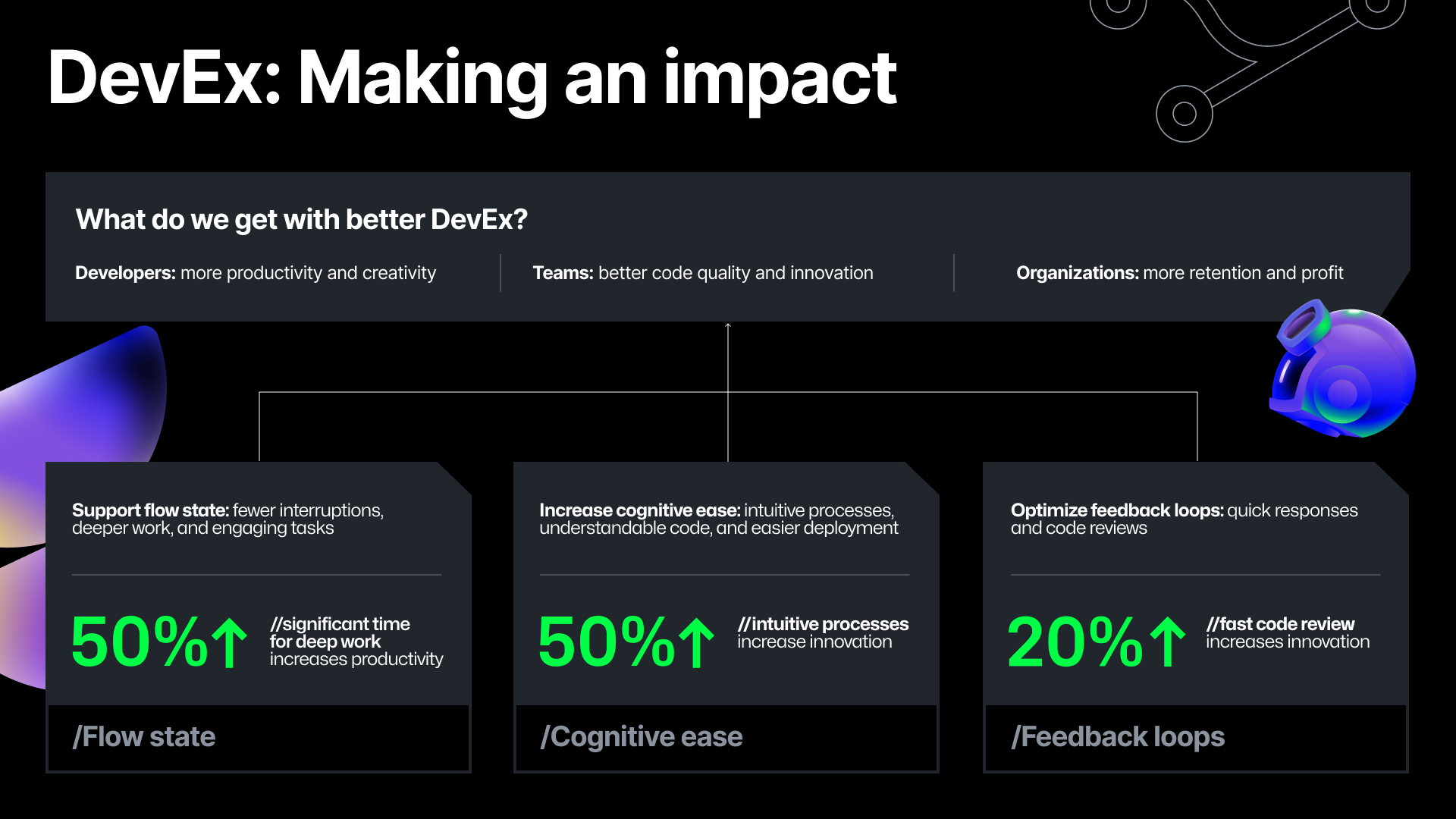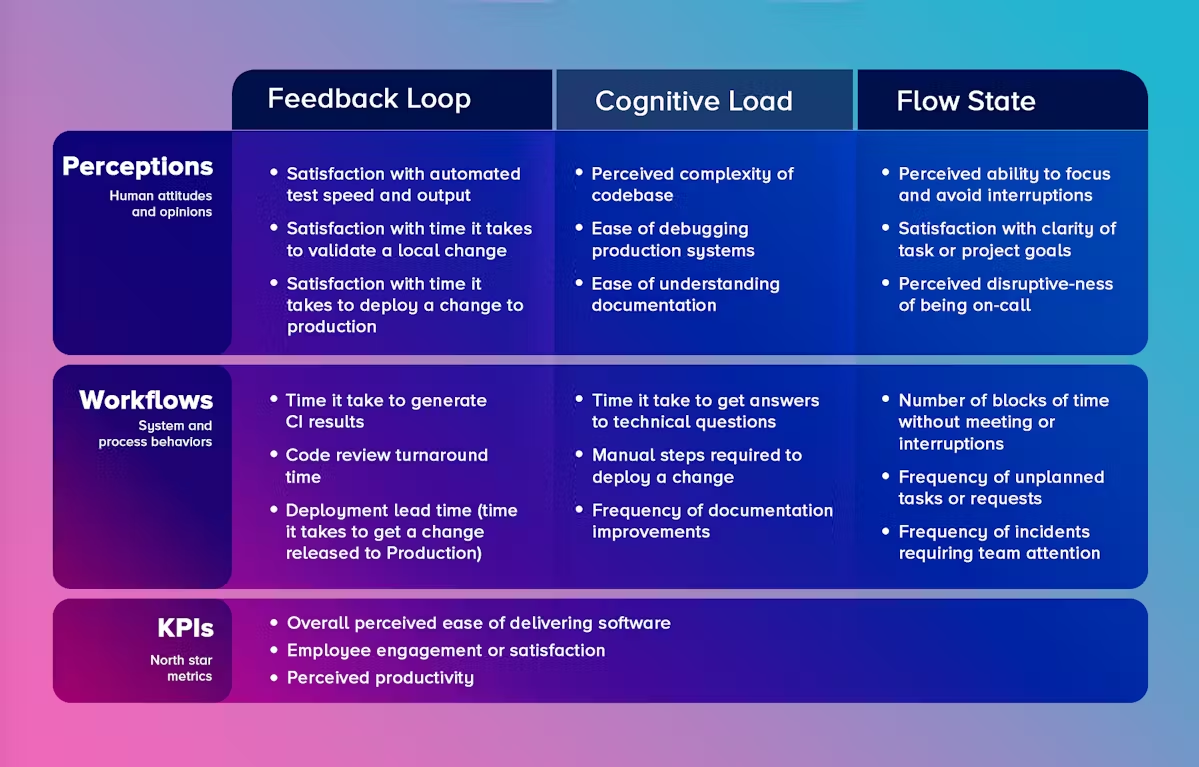A Shift from DevOps to DevEx: Shaping the Future of Technology
DevOps has transformed the software development lifecycle by integrating development and operations, fostering collaboration, and automating processes to enhance efficiency. However, as technology evolves, there is a growing focus on Developer Experience (DevEx), which aims to optimize the overall experience of developers. This shift promises not only enhanced productivity but also greater innovation and job satisfaction.
Understanding DevEx
DevEx encompasses all aspects of a developer’s interaction with tools, systems, and processes. It aims to create an environment where developers can focus on coding and innovation rather than dealing with cumbersome processes and tools.
Key Metrics and Data
Developer Productivity:
- According to a survey by Stripe, developers spend more than 17 hours per week on maintenance tasks, with only 13 hours spent on actual development.
- Improving DevEx can shift this balance, potentially adding $300 billion to global GDP over the next ten years.
Time to Market:
- Companies with a strong focus on DevEx have reported a 60% reduction in time to market for new features and products.
- Accelerating the development process while maintaining high quality can provide a competitive edge.
Developer Satisfaction and Retention:
- A Stack Overflow survey found that 58% of developers prioritize job satisfaction over salary.
- Enhancing DevEx can significantly improve job satisfaction, reducing turnover rates and associated hiring costs.
Collaboration and Innovation:
- Google’s State of DevOps report highlights that high-performing teams with a focus on DevEx are 1.5 times more likely to recommend their organizations as a great place to work.
- Improved collaboration tools and processes lead to more innovative solutions and higher quality software.
 Source: Internet
Source: Internet
Elements of a Strong DevEx
Tooling and Infrastructure:
- Providing developers with modern, efficient tools and a robust infrastructure reduces friction and enhances productivity.
- Cloud-native solutions and integrated development environments (IDEs) that streamline workflows are essential.
Automation:
- Automating repetitive tasks such as testing, deployment, and monitoring allows developers to focus on innovation.
- Continuous Integration/Continuous Deployment (CI/CD) pipelines are critical components of DevEx.
Documentation and Support:
- Comprehensive and accessible documentation is vital for developers to quickly understand and utilize tools and systems.
- Support systems, including peer support and dedicated help desks, are also important.
Feedback Loops:
- Rapid feedback on code changes and deployments helps developers iterate quickly and improve software quality.
- Tools that provide real-time insights into performance and user feedback are valuable.
 Source: Internet
Source: Internet
Adoption and Future Prospects
Case Studies:
- Netflix: By prioritizing DevEx, Netflix has created a culture of innovation, allowing it to rapidly deploy new features and maintain high availability.
- Spotify: Spotify’s focus on DevEx through autonomous squads and tribes has enabled it to scale rapidly while maintaining agility and developer satisfaction.
Industry Trends:
- The rise of platform engineering is a testament to the growing importance of DevEx, with dedicated teams building and maintaining internal developer platforms.
- The adoption of low-code and no-code solutions is another trend aimed at enhancing DevEx by enabling faster prototyping and development.
The Role of AI and ML:
- Artificial Intelligence (AI) and Machine Learning (ML) are playing a significant role in improving DevEx by automating complex tasks and providing intelligent insights.
- Tools like GitHub Copilot, which offers AI-powered code suggestions, exemplify the future direction of enhancing DevEx.
Community and Open Source:
- The open-source community is crucial in driving DevEx improvements, with developers contributing to and benefiting from shared tools and practices.
- Companies are increasingly participating in and supporting open-source projects to foster innovation and improve DevEx.
Conclusion
The shift from DevOps to DevEx represents a natural evolution in the pursuit of efficiency, innovation, and satisfaction in the software development lifecycle. By focusing on the holistic experience of developers, organizations can unlock new levels of productivity and creativity, shaping the future of technology. As tools, processes, and cultures continue to evolve, the emphasis on DevEx will become a cornerstone of successful, innovative technology organizations.